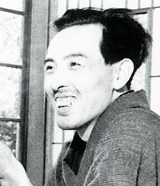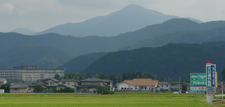
Kyuya Fukada
Encyclopedia

was a Japanese
Japanese people
The are an ethnic group originating in the Japanese archipelago and are the predominant ethnic group of Japan. Worldwide, approximately 130 million people are of Japanese descent; of these, approximately 127 million are residents of Japan. People of Japanese ancestry who live in other countries...
writer and mountaineer active during the Showa period
Showa period
The , or Shōwa era, is the period of Japanese history corresponding to the reign of the Shōwa Emperor, Hirohito, from December 25, 1926 through January 7, 1989.The Shōwa period was longer than the reign of any previous Japanese emperor...
in Japan
Japan
Japan is an island nation in East Asia. Located in the Pacific Ocean, it lies to the east of the Sea of Japan, China, North Korea, South Korea and Russia, stretching from the Sea of Okhotsk in the north to the East China Sea and Taiwan in the south...
.
Early life
Kyūya was born in what is now Kaga cityKaga, Ishikawa
is a city located in the southwest of Ishikawa Prefecture, Japan.Created as an old temple town, the city was greatly developed by the Maeda clan in the early Edo period...
, Ishikawa prefecture
Ishikawa Prefecture
is a prefecture of Japan located in the Chūbu region on Honshū island. The capital is Kanazawa.- History :Ishikawa was formed from the merger of Kaga Province and the smaller Noto Province.- Geography :Ishikawa is on the Sea of Japan coast...
. He attended the Fujishima High School
Fujishima High School
Fukui Prefectural Fujishima High School is a high school in Fukui, Japan, founded in 1855. The school is operated by the Fukui Prefectural Board of Education...
, followed by the preparatory school for the Tokyo Imperial University, where he studied literature. During this time, he became friends with Hori Tatsuo
Hori Tatsuo
was a writer, poet, and translator in Showa period Japan.-Early life:Hori was born in Tokyo, and was a graduate of Tokyo Imperial University. While still a student, he contributed translations of modern French poets to a literary journal called Roba, which was sponsored by poet Murō Saisei...
and Takami Jun. He also joined the school's mountaineering
Mountaineering
Mountaineering or mountain climbing is the sport, hobby or profession of hiking, skiing, and climbing mountains. While mountaineering began as attempts to reach the highest point of unclimbed mountains it has branched into specialisations that address different aspects of the mountain and consists...
club, and took the pen-name of Kyusan (literally Nine Mountains) as his haiku pseudonym.
While a student at Tokyo University, he began writing short stories, and he also fell in love with the poet Kitabatake Yao
Yaho Kitabatake
was a poet and children's fiction writer in Showa period Japan.-Early life:Kitabatake Yaho was born in Aomori city, Aomori Prefecture as the sixth of ten children. After her graduation from high school, she moved to Tokyo and attended the Jissen Women's University, but was forced to drop out due...
. Shortly after they started living together, he published his first work. Orokko no musume. The work was well received by critics, emboldening him enough to quit school in 1930 and to devote his energies to writing.
Literary career
In 1932, Fukada published his next work, Asunarao. However, leading literary critics Kobayashi HideoKobayashi Hideo
was a Japanese author, who established literary criticism as an independent art form in Japan.-Early life:Kobayashi was born in the Kanda district of Tokyo. He studied French literature at Tokyo Imperial University and graduated in 1927...
and Kawabata Yasunari soon realized that Asunarao and his previous work Orokko no musume were not Fukada's works at all, but had been copy-edited (or to put it less charitably, plagiarized
Plagiarism
Plagiarism is defined in dictionaries as the "wrongful appropriation," "close imitation," or "purloining and publication" of another author's "language, thoughts, ideas, or expressions," and the representation of them as one's own original work, but the notion remains problematic with nebulous...
) from the writings of Kitabatake Yao, which nearly ended his credibility as a writer.
In March 1940, Fukada formally married Kitabatake Yao. However, in May 1941, Fukada happened to be reunited with his first love, Koba Shigeko (the sister of Nakamura Mitsuo) in a chance meeting, and by August 1942, Shigeko gave birth to his illegitimate child. His wife soon found out about the affair, and Fukada quickly enlisted in the Imperial Japanese Army
Imperial Japanese Army
-Foundation:During the Meiji Restoration, the military forces loyal to the Emperor were samurai drawn primarily from the loyalist feudal domains of Satsuma and Chōshū...
, asking for an immediate transfer to the front lines war-time China
China
Chinese civilization may refer to:* China for more general discussion of the country.* Chinese culture* Greater China, the transnational community of ethnic Chinese.* History of China* Sinosphere, the area historically affected by Chinese culture...
to avoid the potentially more dangerous conflict at home; he served for the next three years in front-line combat units from Tsingtao to Nanjing
Nanjing
' is the capital of Jiangsu province in China and has a prominent place in Chinese history and culture, having been the capital of China on several occasions...
.
At the end of the war, Fukada was demobilized, and returned to Japan in 1946, but he avoided a reunion with his wife and went back to Shigeko, whom he married as soon as his divorce was finalized. However, Fukada and his new wife were forced to live in poverty over ten years, as his former wife made sure that earlier issue of his “copy editing” of her works was remembered by publishers. Partly due to the stigma he was unable to publish any works for over 10 years.
Fukada was reconciled with fellow mountaineer Kobayashi Hideo, who encouraged him to write non-fiction works about mountains and mountaineering. From 1959-1963, he wrote Nihon Hyakumeizan (100 Famous Japanese Mountains), which was an immediate hit, and which won the 16th Yomiuri Prize
Yomiuri Prize
The is a prestigious literary award in Japan. The prize was founded in 1948 by the Yomiuri Shinbun Company to help form a "cultural nation". The winner is awarded one million Japanese yen and an inkstone.-Award categories:...
. In 1968, Fukada was made vice-chairman of the Japan Mountaineering Association. In 1966, and again in 1969-1970, he made long journeys in Central Asia
Central Asia
Central Asia is a core region of the Asian continent from the Caspian Sea in the west, China in the east, Afghanistan in the south, and Russia in the north...
of China
China
Chinese civilization may refer to:* China for more general discussion of the country.* Chinese culture* Greater China, the transnational community of ethnic Chinese.* History of China* Sinosphere, the area historically affected by Chinese culture...
and the Soviet Union
Soviet Union
The Soviet Union , officially the Union of Soviet Socialist Republics , was a constitutionally socialist state that existed in Eurasia between 1922 and 1991....
, exploring the mountains of the Silk Road
Silk Road
The Silk Road or Silk Route refers to a historical network of interlinking trade routes across the Afro-Eurasian landmass that connected East, South, and Western Asia with the Mediterranean and European world, as well as parts of North and East Africa...
.
Fukada died in March 1971 near the summit of Mount Kayagadake (1704 m) in Yamanashi prefecture
Yamanashi Prefecture
is a prefecture of Japan located in the Chūbu region of the island of Honshū. The capital is the city of Kōfu.-Pre-history to the 14th century:People have been living in the Yamanashi area for about 30,000 years...
of cerebrovascular disease
Cerebrovascular disease
Cerebrovascular disease is a group of brain dysfunctions related to disease of the blood vessels supplying the brain. Hypertension is the most important cause; it damages the blood vessel lining, endothelium, exposing the underlying collagen where platelets aggregate to initiate a repairing process...
. His grave is at the temple of Honko-ji in Daishoji-machi, Kaga city, Ishikawa prefecture.
Fukada was honored by the Japanese government with a commemorative postage stamp issued on 1 July 2003.
See also
- Japanese literatureJapanese literatureEarly works of Japanese literature were heavily influenced by cultural contact with China and Chinese literature, often written in Classical Chinese. Indian literature also had an influence through the diffusion of Buddhism in Japan...
- List of Japanese authors
- 100 Famous Japanese Mountains

